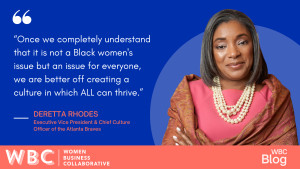Written by: DeRetta Rhodes, PhD – EVP/Chief Culture Officer, Atlanta Braves
In February 2021, CNN highlighted the groundbreaking strides made by Black executive women, yet underscored a stark reality: in 2018, a mere 3.3% of US corporate executives were Black, with only two Black women occupying CEO roles. This statistic illuminates a profound disparity and emphasizes the mammoth responsibility Black women shoulder as they navigate the often challenging terrain of corporate leadership.
Many corporate organizations will have to think intentionally about embracing Black women who are currently in leadership positions. Black women are faced with how to relate in leadership roles by being both black and a woman. The challenges that surface for Black women is trying to maintain their identity and be successful in constructs that they navigate. Dualism occurs when Black women find that they have to be part of different cultures which forces them to live various different lives. They have to work, live, socialize in different spaces and typically all of them require them to show different parts of their selves, which could be considered splicing.
Within the complexity of any organization, the importance of culture impacts those that reside within the construct. A Black woman must always carry the awareness of both her gender and race. She is reminded as she moves from place to place in the organization, there are very few black women in executive positions or positions of power. Race and gender are a phenomenon that organizations are going to have to contend with as long as they do business and hire employees. The concept of the glass ceiling concept has been one that women have faced in their careers but the thought of advancement for Black women has been considered not glass but concrete. It is the inability to ascend into certain positions within Corporate America. Unlike the glass ceiling, the concrete ceiling is a barrier, perception, and attitude that Black women cannot advance beyond a certain level. The reality is that some organizations and leaders have made tremendous strides in opening opportunities, sponsoring, and mentoring however the number of Black Women in executive positions as compared to the population is disproportionate and therefor organizations still have an opportunity to create mechanisms that support inclusion.
The biggest challenge for Black women to advance is to create trusting relationships with also dealing with microaggressions and mistrust from those that they work with. The ability to cultivate trust is critical but difficult in the midst of the all the other issues around them. But they become the mere ability for them to thrive in the environments that they navigate. The ability to build trustworthiness across the organizations and communities that they live in is crucial. I know for me personally that all of my mentors, sponsors, friends and community/tribe both saved me and allowed me to thrive personally and in my career. These amazing relationships allowed me to become equipped with how to understand the importance of relational collateral and has supported me in all organizations, boards and professional organizations that I am a part. I realize that I am judged by different standards, but I also have realized that I have my community to fall back on to give me the feedback and support needed for me to manage and handle any obstacles and barriers.
I have a callout to Black women to find their community, use their voice and help those that are shoulder to shoulder to you, in junior roles to be that role model, mentor and sponsor that you have had or needed while in your journey. I callout all Leaders and Executives to support, sponsor and mentor someone that do not look like you and pour into them to support them to thrive and create environments and teams that will allow them do so. Younger professionals, seek those that don’t look like you to support, guide and mentor you. Once we completely understand that it is not a Black women’s issue but an issue for everyone, we are better off creating a culture in which ALL can thrive.
Ultimately, the empowerment of Black women in corporate leadership transcends individual achievement; it is a shared imperative for organizations and society at large. By acknowledging and addressing the systemic barriers that persist, we move closer to realizing a future where all individuals, regardless of race or gender, can ascend to positions of power and influence.
#WBCFasterTogether
-
DeRetta Rhodes, Ph.D. is the Executive Vice President & Chief Culture Officer of the Atlanta Braves, overseeing people capital initiatives, communications and community affairs for the Braves, The Battery Atlanta and team’s Spring Training facility operations.
View all posts








